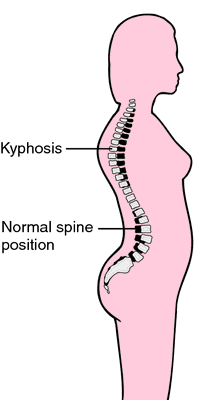Medical term:
gibbosity
kyphosis
[ki-fo´sis]abnormally increased convex curvature of the thoracic spine as seen from the side; it may be the result of an acquired disease, an injury, or a congenital disorder or disease. It never develops from poor posture. One of the most common causes is postmenopausal osteoporosis accompanied by anterior vertebral body wedge-compression fractures. adj., adj kyphot´ic.
Kyphosis sometimes occurs with certain forms of poliomyelitis and with diseases that cause bone destruction, as happens in osteitis deformans (paget's disease). An injury, such as a fracture of the spine, treated improperly or not at all, may also result in hunchback. Some rare cases are caused by congenital deformities and diseases. One example, achondroplasia, or fetal rickets, is a congenital bone disorder that affects growth and bone formation. There are no specific symptoms besides back pain and increasing immobility of the spine. Symptoms vary with the cause, and any back pain or injury should be investigated.
Kyphosis sometimes occurs with certain forms of poliomyelitis and with diseases that cause bone destruction, as happens in osteitis deformans (paget's disease). An injury, such as a fracture of the spine, treated improperly or not at all, may also result in hunchback. Some rare cases are caused by congenital deformities and diseases. One example, achondroplasia, or fetal rickets, is a congenital bone disorder that affects growth and bone formation. There are no specific symptoms besides back pain and increasing immobility of the spine. Symptoms vary with the cause, and any back pain or injury should be investigated.

Kyphosis. From Frazier et al., 1996.
Miller-Keane Encyclopedia and Dictionary of Medicine, Nursing, and Allied Health, Seventh Edition. © 2003 by Saunders, an imprint of Elsevier, Inc. All rights reserved.
gibbosity
(gĭ-bŏs′ĭ-tē)n. pl. gibbosi·ties
A rounded hump or protuberance.
The American Heritage® Medical Dictionary Copyright © 2007, 2004 by Houghton Mifflin Company. Published by Houghton Mifflin Company. All rights reserved.
Latest Searches:
Voraxaze - Voranil - Voorhoeve - voodoo - VOO - Vontrol - von - vomitus - vomiturition - vomitory - vomitoria - vomito - vomitive - vomiting - vomit - vomica - vomerovaginalis - vomerovaginal - vomerorostralis - vomerorostral -
- Service manuals - MBI Corp